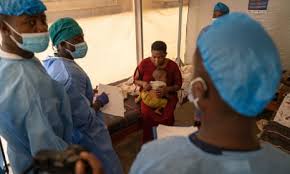
Introduction Europe
Mpox, formerly known as monkeypox, has recently made headlines in Europe, raising concerns about its spread and impact. However, while the detection of Mpox cases in European countries is noteworthy, the real emergency lies in Africa, where the virus has been a persistent and serious issue for years. This essay explores the implications of Mpox in Europe and contrasts it with the more severe situation in Africa, underscoring the need for a nuanced understanding and response to this health threat.
Table of Contents
Mpox in Europe: A Snapshot
Mpox is a viral zoonosis, meaning it is transmitted from animals to humans, with symptoms similar to but milder than smallpox. The virus was first identified in laboratory monkeys in 1958, and human cases have primarily been reported in Central and West Africa. In recent times, Europe has seen a notable increase in Mpox cases, prompting health authorities to issue warnings and initiate public health measures.
The European outbreak has raised alarms due to its potential for wider spread, given the high mobility of populations and the interconnectedness of global travel. European countries have implemented strategies such as vaccination campaigns, contact tracing, and public health advisories to manage the situation. However, the overall number of cases in Europe remains relatively low compared to Africa, and the continent’s robust healthcare infrastructure has thus far managed the outbreaks effectively.
The True Crisis: Mpox in Africa
In stark contrast, Africa has been grappling with Mpox for decades, with recurrent outbreaks that have often gone underreported and under-addressed. The virus is endemic in several African countries, including the Democratic Republic of the Congo (DRC), Nigeria, and Cameroon. These regions face a different set of challenges that exacerbate the impact of Mpox.
- Healthcare Infrastructure
One of the most significant issues is the inadequate healthcare infrastructure in many African countries. Limited access to medical facilities, insufficient diagnostic capabilities, and a shortage of healthcare professionals all contribute to the difficulties in managing Mpox outbreaks. In rural areas, where outbreaks are often first detected, healthcare resources are sparse, and patients may not receive timely care.
- Public Awareness and Education
Public awareness about Mpox and its prevention is often limited in affected regions. Educational campaigns are crucial for preventing the spread of the virus, yet many communities lack access to accurate information about the disease. This gap in knowledge can lead to delayed treatment and increased transmission within communities.
- Economic and Social Factors
Economic instability and social factors also play a significant role in the Mpox crisis in Africa. Many affected regions struggle with poverty, which limits access to healthcare and increases vulnerability to diseases. Additionally, cultural practices and traditions can influence health behaviors and complicate efforts to control outbreaks.
- Surveillance and Reporting
Surveillance systems in many African countries are often underdeveloped, leading to underreporting and an incomplete understanding of the true extent of Mpox outbreaks. Improved surveillance and reporting systems are essential for effective outbreak management, but many regions lack the necessary infrastructure and resources.
Global Response and Solidarity
While the situation in Europe is concerning, it is crucial to acknowledge and address the more severe crisis in Africa. A global response to Mpox must be multifaceted and inclusive, ensuring that efforts are directed not only at managing outbreaks in high-income countries but also at supporting affected regions in Africa.
- Strengthening Healthcare Systems
Investing in healthcare infrastructure in Africa is essential for improving the management of Mpox and other infectious diseases. This includes building and equipping medical facilities, training healthcare professionals, and improving access to diagnostics and treatments.
- Enhancing Public Awareness
Public education campaigns tailored to local contexts are vital for increasing awareness about Mpox, its transmission, and prevention methods. Collaborations with local organizations and community leaders can help disseminate information effectively and encourage health-seeking behaviors.
- Supporting Economic Development
Addressing economic factors that contribute to health vulnerabilities is crucial. Supporting economic development initiatives in affected regions can improve overall health outcomes and reduce the impact of diseases like Mpox.
- Improving Surveillance and Reporting
Strengthening surveillance and reporting systems will help track the spread of Mpox more accurately and enable timely interventions. International support for these systems can enhance their effectiveness and ensure that outbreaks are managed more efficiently.
Conclusion Europe
The recent detection of Mpox in Europe has certainly garnered attention, but it is essential to recognize that the real emergency lies in Africa. The challenges faced by African countries in managing Mpox are deeply rooted in issues related to healthcare infrastructure, public awareness, economic stability, and surveillance. A comprehensive global response must address these challenges with empathy and urgency, ensuring that resources and support are directed where they are most needed. By focusing on both immediate and long-term solutions, we can better manage Mpox outbreaks and work towards a more equitable and effective global health response.







